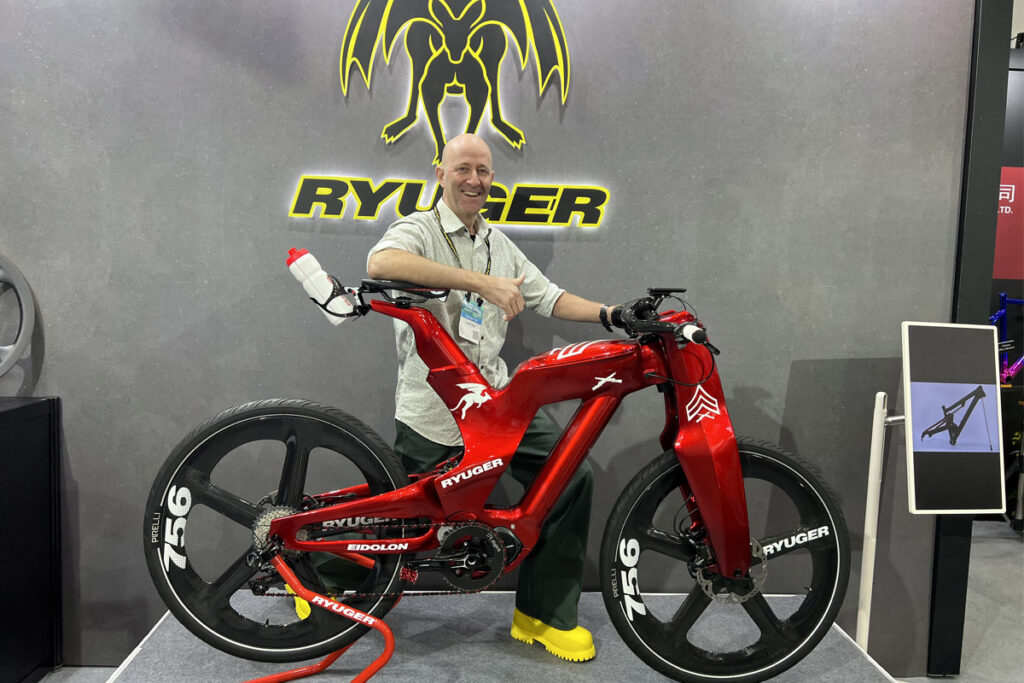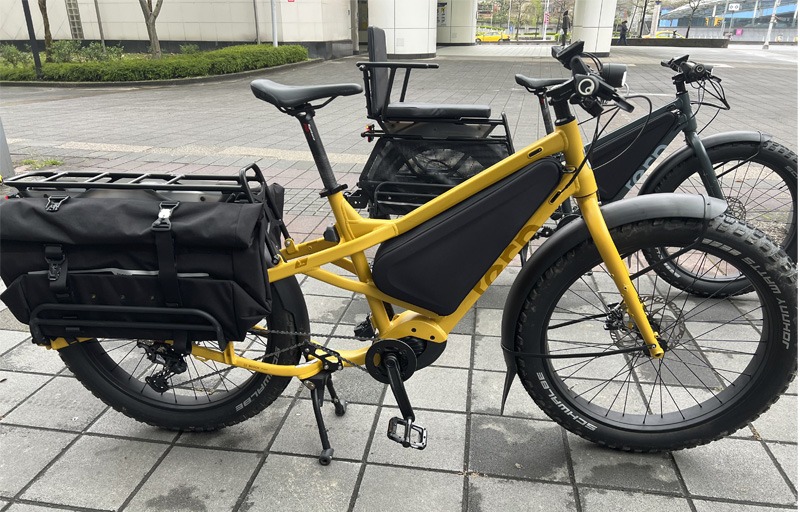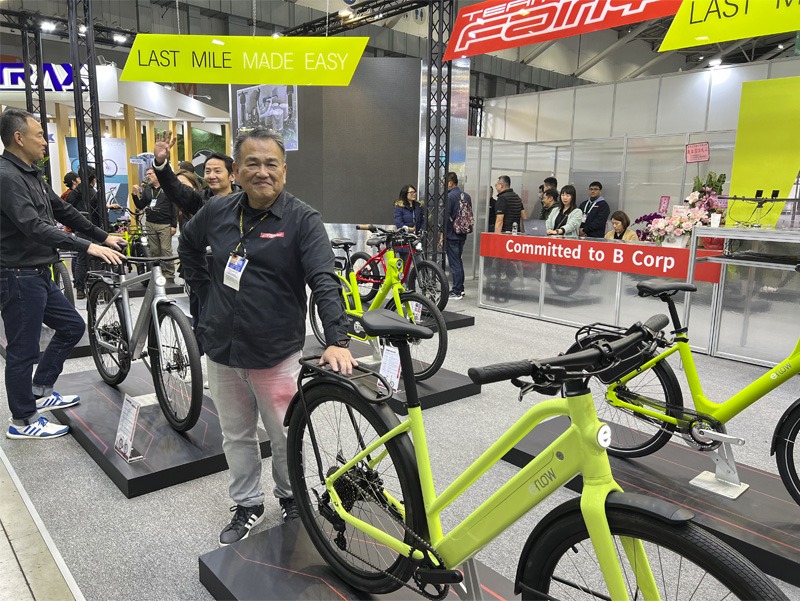Three Examples of Increasing Product Diversity

Taipei, Taiwan
Just two decades ago the cycling market was much simpler. In Australia there were mainly just road, mountain and family/kids bike categories.
There were virtually no ebikes, no gravel bikes, no bike share, no cargo bikes, no subscription schemes, not to mention, no e-scooters.
The 2024 Taipei Cycle reflects all of these changes, which all of these new categories, and more, being well-represented at the Expo. In this article we’ll look at three examples.
Is it A Bird? Is it a Plane? No, it’s a Ruyger!
Walking through three halls filled with hundreds of booths, you see a lot of similar products. I first saw the Alligator-branded version of a totally radical looking design and heard that the company was owned by an Australian, who had his own booth nearby. I had to investigate further.
Sure enough I found another booth, where the bike was branded Ruyger, complete with a flying kangaroo logo, although nothing like the Qantas version.
There I met designer and owner Brent Richards who was ready to tell me his unique story.
“I moved to Japan in 1993 and started a very small business at the time called Nengun Performance. We distribute after-market automotive parts to countries around the world,” he began.
“I stepped down as CEO of that company about 10 years ago and it’s run by another Australian, also in Japan, Alan Taylor, but I remain the sole owner.
“Then I went back to Perth and teamed up with Glen Oldfield who used to work for McLaren in Formula One motor racing. He taught me all about carbon fibre and design. Then I came up to Taiwan and we developed an e-bike that could do 200 kph. It was just a one-off.
“Then I teamed up with Troy Yu and he let me take over a defunct factory in Taiwan. I have a team there of about 15 and we can make whatever we want.”
Brent was also displaying a range of other products including powered surfboards, sunglasses and bags. Reading between the lines, it’s these products that are probably selling in sufficient volume to pay the bills, while the bike is a showcase of the company’s carbon design and manufacturing capabilities.
My next question was the rationale behind the name Ruyger.
Brent explained, “The company Ruyger is registered in Japan and there’s a warehouse there. The name ‘Ruy’ (Pronounced ‘roo’) we’re Aussies so it’s kangaroo, but “RUY” is Japanese for a dragon that has no wings, because I make hybrids. “GER” is the quiet sound that a kangaroo makes. It’s trademarked in the USA, even though it’s exactly the same pronunciation as Ruger the gun company.”
Ruyger bikes, like all of his products, are distributed online only, to customers around the world.
“Will.i.am from the Black Eyed Peas bought one,” Brent said proudly.
I can’t recall seeing another bicycle previously that has twin discs at the front and I wondered if this was mainly for appearance, but Brent said otherwise.
“We’ve made our own carbon girder forks but there was lateral movement with one disc,” Brent explained. “We needed even braking.”
The Ruyger comes with a Shimano e8000 motor and in standard configuration it complies with the Australian 250 watt power rating, but can be modified via software to deliver more power.
What’s the price for having something that no other kid on the block has? A$20,000. Perhaps not surprisingly, Brett says he’s only selling about five of these bikes per year.
But he’s not concerned either by the price or the sales volume.
“They take quite a lot of labour to make,” he said. “Everything is hand made.”

Tern Orox – The First of Another New Bike Category?
Just seven years ago, niche bicycle manufacturer Tern, until then best known for making folding bikes, launched the GSD (“Get Stuff Done”) – a long tail, electric power assist, non-folding 20 inch wheel, compact cargo bike.
At the time it was a big financial risk on creating an unproven new category of bike. Fast forward to 2024 and there would be at least 20 different brands of compact cargo bikes on the market, including at least one each from majors such as Specialized, Giant, Trek and Cannondale.
Now Tern have just launched the Orox, which they’re calling the first ‘Adventure Cargo Bike’. You might call it a bicycling equivalent of a Land Rover.
I had my first opportunity to briefly test ride the Orox just outside the halls of Taipei Cycle. With nothing tougher than a paved kerb or two to ride over, it was hardly an off road test. But first impressions were of a very smooth, comfortable bike, with very wide handlebars and a relaxed riding position. Despite its large size and high weight, it was easy to ride. The bike as ridden weighed 34.4kg. It’s possibly the heaviest bike on the market. Please make a comment below if you know of a heavier one!
I also had the opportunity to talk with Tern’s founder and CEO Josh Hon about the new bike, but first a summary of what’s different about the specifications of the Orox.
The Orox has been designed to carry heavy loads, for long distances, over rough terrain. It has been certified to carry up to 210kg on road or 180kg off road, including a 100kg capacity long rear rack. If that’s not enough carrying capacity, it also has a built in tow bar designed to haul a heavy trailer.
It can hold 2 x 800Wh batteries for a range of up to 260 kilometres. Its fully rigid aluminium frame and fat steel forks, can run three different wheel configurations, 26 x 5 inch, 27.5 x 4 inch or 29 x 3 inch.
The tyres need to be fat, because there is no suspension front or rear. Lights and mudguards are fitted as standard equipment. The drivetrain combines a Bosch Performance CX 250 watt motor with Shimano Deore 12×1 drivetrain and Magura MTS four piston hydraulic brakes. There’s also a belt drive version with a Rohloff 14 speed hub.
I began by asking Josh about the story behind Orox’s development.
“It’s been in development for two and a half years,” he said. “We’ve got a few people (other bike companies) interested in what we’re doing these days. You can see people around the show who have been taking inspiration from what we’re doing, so we have to be secretive.
“We have a small product team. We’re always riding bikes and talking about bikes and saying, ‘What are the bikes we’d like to do next?’
“We periodically pitch things to each other. It usually revolves around things that we want to use ourselves.
“Our head designer, Jojo, said, ‘I live in Finland in a small town…’
“He’s never owned a car, so he rides through the winter.
“He said, ‘To get to the city centre, the most direct way is to go via the river path. I could take the long way round via the roads, but then I’m with cars and in winter, it’s not very pleasant. But along the river path it’s unpaved, it’s dirt.’
“Until now he’s been riding the GSD but he said, ‘It doesn’t matter what tyres you have on this bike, small wheels just don’t go over thick snow well. What if we make a cargo bike that can go over any type of road?’
Although Tern’s head designer had snow in mind, Josh thinks that the Orox will also find a home in Australia’s vast landscape.
“How much of the planet is paved?” he asked. “How often do you want to go someplace where there is no pavement or the pavement is really bad?
“The more we thought about it, maybe it makes some sense. That’s how our product development works. It’s not customer focus groups.
“It’s a new category of bike. We’re calling it an adventure cargo bike. That hasn’t really existed before.”
The bike was only publicly announced on 21st Feb 2024, with no stock yet on sale in Australia at the time of writing, but first shipments to Europe and the USA due to go on sale in April 2024. Josh described their response so far as ‘very good’.
“Some people are still trying to wrap their heads around it, but some people are saying, ‘Hallelujah! This is what I’ve been waiting for.’
“It’s not just for consumers. It’s for commercial use. For example, people with farms. How do I get my fence repair tools out there? Trail maintenance, forestry workers. When you need to carry a chainsaw, shovels…
“We’ve heard stories of people who have crashed because they’ve biked in with tools poking up from their backpack and they’ve caught a tree branch.
“It could be for first responders in a mountain rescue. Imagine you’re 10 miles into a hike and someone sprains their ankle. Do you send in a helicopter? That’s expensive! Especially in America! It might not be so bad in Australia,” Josh concluded.
The Tern Orox is certainly not an inexpensive bike. In Australia, depending upon the model and accessories included, could top $10,000. Many Australians pay well over $100,000 for a 4×4 vehicle. It will be interesting to see how many are prepared to pay a tenth of that for the bicycle equivalent.

Contract Manufacturer Looks for New Markets
One thing that a first time Australian visitor to Taipei Cycle might be surprised about is that most of the bike manufacturers’ booths have names that, unless they are an experienced bike importer, they will never have heard of.
That’s because most manufacturers don’t market or sell any bikes under their own name, Giant and Merida being rare exceptions. Even then, both of those companies got established through contract manufacturing and still make bikes under contract for other brands.
The major Taiwanese-based manufacturers will typically have their original factory in Taiwan, that now makes their most high-end orders, then one or more larger factories in China, Vietnam or another lower wage country, where they make their volume, lower-end orders. Some also have a factory within Europe, typically in Eastern Europe where wages are lower, so that they can avoid EU (European Union) tariffs.
I spoke with Percy Chen, who is Executive Chairman of the Chen family’s multi-generation business, Fairly Bike that was founded in 1977.
He said that Fairly currently has about 310 employees in their Taiwan factory and a further 180 in their China factory. Like most of their peers, Fairly Bike is versatile and capable of making high end carbon road bikes, aluminium mountain bikes or whatever their customers require.
But more recently Fairly has been embarking on a different path.
Percy recalled, “We had been working on traditional bicycles. From 1997 we got in contact with Mr Lee Iacocca (the one time high profile CEO of Chrysler and later e-bike and Segway pioneer). From then until 2006 we were involved in the infancy of the electric bicycle in the USA.
“In 2016-17 I established eFlow Europe in Germany. It was the starting point of European e-bikes. We decided to do something both for consumers and fleet.
Then during covid we saw a drastic downturn in public bike sharing, but now we’re over covid and we’re having success in the Frankfurt area in Germany and the Basel area in Switzerland.
“So we decided that now it’s time to come with a full program, from personal rentals, one to three month rentals to full public rentals, in mechanical and electric, cargo and scooter. Maybe every year we’ll add to the program.”
Fairly was publicly launching their full program at this year’s Taipei Cycle.
Just like you won’t see their Fairly brand on the high end consumer bikes that they make, you also won’t see their eFlow brand on any fleets.
Most bikes will carry the of their fleet operator or host city. But if you’ve ever wondered where all of those share fleets come from, Fairly Bike is part of the answer.
